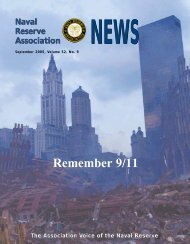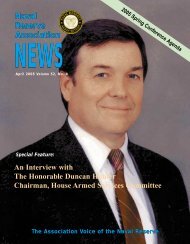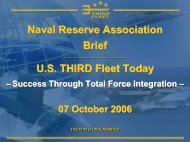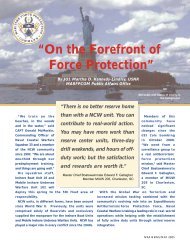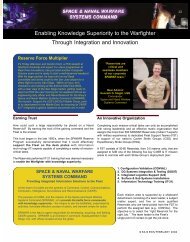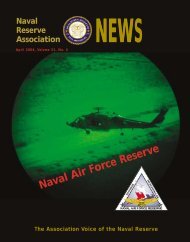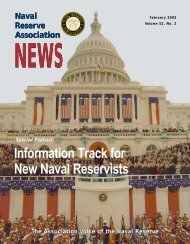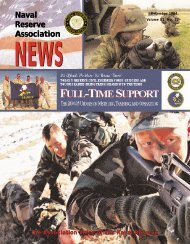Naval Reserve Association Naval Reserve Association
Naval Reserve Association Naval Reserve Association
Naval Reserve Association Naval Reserve Association
- No tags were found...
You also want an ePaper? Increase the reach of your titles
YUMPU automatically turns print PDFs into web optimized ePapers that Google loves.
INTERVIEW WITH MCPONIt just reinforces my belief in the Sailor of the Year program.You know, selected from the deckplates and coming all the wayup. We clearly get the right person.Chief Worrell: It has been good for me, obviously, and,honestly, also good for the Sailors that I work with. They saw whathappened to me, and I notice a lot more motivation in the Sailorsaround me now. They finally saw that it isn’t just something thatyou see in a magazine. It is something that can really happen.MCPON: Well, I looked at some of your advance questions,and I want to talk about a couple of those. I was recently with<strong>Reserve</strong> Chiefs in the Bronx in New York, and there were aboutforty-five or fifty Chiefs. One of the questions that they askedwas very much like your first question. [Is there a blurring oflines between the officer corps and the CPOs?] I wanted them tobe clear on what the expectations of a Chief Petty Officer were. Irecall hearing a lot of talk about blurring the lines. I think in yearspast, we had talked about that, but I’m not sure that we put it in theright context. What I mean by that is if you look throughout ourhistory, whenever there has been a need, Chief Petty Officers havestepped up and filled that need. Wherever the command. If somethinghappens at your command and say, for instance, you get putinto the situation of being the Command Chief, or a DivisionOfficer is gone, and the Chief slides up into that position. We’vebeen doing that for years. We have always been able to do that. Ifthat is blurring the lines, I think that we have always done that.What I want to be clear about is that I want Chiefs to understandwhat their role is. I want every Chief to have a complete understandingof what they bring to the Navy. I want our leadership, thewardroom, I want them to have a clear understanding of what toexpect from the Chief’s mess. And, most importantly, I want ourSailors to understand what they can expect from their Chief.[Our] mission, vision, and guiding principles define that. Itspeaks to our chiefs, it speaks to our leadership, and it speaks toour Sailors. And those principles refocus us on the things thatmake us a Chief’s mess and make our community unique.I don’t particularly like the term “blurring the lines;” and I thinkthat by blurring the lines, by speaking about that in that context,you run the risk of blurring expectations. I have very specificexpectations, and I want them to know what those expectationsare. That’s not to say that you cannot continue to move forwardand to do other things. But, not at the expense of being a Chief!I don’t want any Chiefs to ever subordinate their role as a ChiefPetty Officer to any job or title that they have. So that’s mymessage. So I’m trying to do away with that language of blurringthe lines.Chief Worrell: You have talked about expectations, especiallywhat the junior Sailor should expect from his/her Chief. I thinkthat every Chief knows in his/her own heart what that is; but justto put it into words, what would you say is that expectation?MCPON: I want them to expect a leader. Someone who isgoing not only to train them but also to develop them. We do thatin a couple of different ways. We develop them technically so thatthey grow in their rate. But we also pass down institutionalknowledge. We develop them and give them an understanding ofour Navy. In a sense, Chiefs are passing down their knowledgeand their experience from one generation of Sailor to the next.But also, the Sailor has to be accountable to the Chief. The Sailorhas to know that the Chief is going to do what is in his/her bestinterest, but they are going to be accountable for their actions.They are going to have someone who is well connected to themand who speaks on their behalf. Someone who raises theirconcerns to the chain of command. And that is our connection.In our Guiding Principles, I talk about us being aligned andconnected with our leadership and our Sailors.And, I want Chiefs out and about leading. I want them leadingon the deckplates. That’s not to say that Chiefs don’t haveadministrative responsibilities. We all do . . . . It is important,though, for us to be out on the deckplates, to maintain thatconnection. Chiefs do that day in and day out, and they have todo that. I expect Chiefs to set the tone and to measure their successthrough the success of those that they lead. I tell Chiefs, if youwant to measure how you are doing, walk into a space filled withyour Sailors and if the tone in that space doesn’t change, then thatChief needs to do a gut check. I expect when a Chief walks intoa space the tone in that space will change because the Chief isthere. That is the type of deckplate leadership that I want to blanketour Navy with. When you check on to a ship, you can go aroundto different divisions and some divisions are doing great. In somedivisions the Sailors are thriving. They are motivated and you talkto them and their quality of life is good because their quality ofleadership is good. You go to another division and Sailors maynot be doing so well, and I look at their quality of leadership andit is directly tied. Those commands that are doing phenomenalthings in our Navy, which are the majority, are doing so becausethey are well led. That’s the common denominator.Chief Worrell: You recently spoke at the annual First ClassPetty Officer’s symposium. What did you say to them?MCPON: I told them how important their role as a First ClassPetty Officer is to the success of our Navy. I believe that we don’tcapitalize on the experience and the talent that is in our FirstClass community the way we should. When you make Chief, thatis a pretty big leap and I think that we could do a little better inbringing them [First Class] along and minimize that gap. We talka lot about the Chief and Division Officer relationship, which isvery critical. Well, that other relationship is that First Class andChief relationship and that has to be just as strong . . . .Thatconnection with the LPO is critical, and it is something that Iwant to enhance. I told them to challenge themselves and lookfor that additional responsibility. We need to give them moreopportunity to do more.Chief Worrell: I want to talk about the National Call toService Program. I get a lot of questions about that. First of all,what is your evaluation of how it has worked up to this point?MCPON: I think that at some point we need to review [theprogram] and see if it is doing what we want it to do. Is itmeeting the needs? I do get comments from Sailors every where16 NRA NEWS/SEPTEMBER 2007



